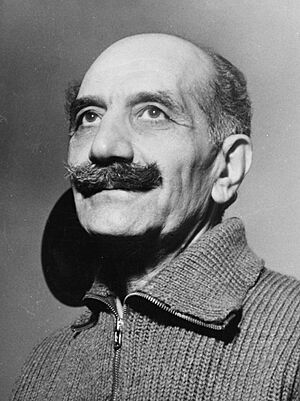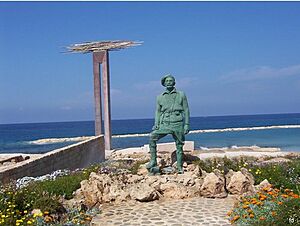Georgios Grivas facts for kids
Quick facts for kids
Georgios Grivas
|
|
|---|---|

Grivas c. 1967
|
|
| Native name |
Γεώργιος Γρίβας
|
| Nickname(s) | Digenis Διγενής |
| Born | 6 June 1897 Trikomo, British Cyprus (now Republic of Cyprus) |
| Died | 27 January 1974 (aged 76) Limassol, Republic of Cyprus |
| Buried |
Limassol, Republic of Cyprus
|
| Allegiance | |
| Service/ |
|
| Years of service | 1916-1974 |
| Rank | |
| Unit | 10th Infantry Division |
| Battles/wars |
|
| Alma mater | Hellenic Military Academy École Militaire |
Georgios Grivas (born June 6, 1897 – died January 27, 1974) was a military leader from Cyprus. He was also known by his nickname Digenis. He founded and led several Greek and Greek Cypriot groups, including Organization X, EOKA, and EOKA B. These groups played a big part in the history of Cyprus.
Grivas was an expert in guerrilla warfare, which is a type of fighting where small groups use surprise attacks. He was a key figure in the struggle for Cyprus's independence from the British Empire. He helped Cyprus become an independent country. He passed away just six months before a major political event in Cyprus in 1974.
Contents
Early Life and Education
Georgios Grivas was born in a village called Trikomo in Cyprus on May 23, 1898. He was the fourth child of Kalomira Hatzimichael and Theodoros Grivas. He grew up in Trikomo and went to the village school.
From 1909 to 1915, he studied at the Pancyprian Gymnasium in Nicosia. During this time, he lived with his grandmother.
Early Military Career
In 1916, Grivas moved to Greece. He became a Greek citizen and joined the Hellenic Military Academy. He also studied at the École Militaire in Paris, France.
He finished his studies in 1919 and became a Sub-Lieutenant in the Hellenic Army. He was sent to fight in the Greco-Turkish War. He served in the 10th Division and fought in important battles like the Battle of the Sakarya. He was recognized for his bravery and promoted to Lieutenant.
After returning to Greece, he taught at the Hellenic Military Academy. He was promoted to captain in 1925 and to Major in 1935. In 1937, he married Vasiliki Deka.
World War II and German Occupation
When World War II started, Grivas worked on defense plans for Greece. In December 1940, he was sent to the Albanian front during the Greco-Italian War.
After Greece was occupied by Germany, Italy, and Bulgaria, Grivas started a small group called Organization X. This group was made up of Greek Army officers. They helped the Greek Resistance by spying for the Allied powers and carrying out small attacks against the occupiers.
In December 1944, members of Organisation X fought alongside British and Greek forces in Athens. They helped prevent other groups from taking control of the city. In 1946, Grivas left the Hellenic Army. He tried to enter politics but was not successful.
The EOKA Campaign for Independence
After leaving the army, Grivas focused on freeing Cyprus from British rule. He wanted Cyprus to unite with Greece, a goal known as "Enosis." He worked with Archbishop Makarios III to prepare for an armed struggle.
In November 1954, Grivas secretly arrived in Cyprus. He quickly formed a guerrilla group called EOKA. On April 1, 1955, he announced the start of their campaign. He signed the declaration as DIGENIS. EOKA began with bombings against British targets in major cities.
Grivas led EOKA operations from a hideout in Nicosia. Later, he moved to the Troodos mountains to lead his fighters directly. At first, he only wanted to target British soldiers and their Greek helpers. He did not allow attacks on Turkish Cypriots.
He escaped capture by British forces twice. Once at Spilia in December 1955, which led to the Battle of Spilia. Another time at Kykkos in May 1956. He later moved to a hideout in Limassol. From there, he directed both military and political actions, especially after Archbishop Makarios was sent away by the British in March 1956. The British offered a reward of 10,000 British pounds for information leading to his arrest.
Return to Greece
In early 1959, the Zurich-London agreements were signed. Cyprus became an independent state. Grivas reluctantly ordered a cease-fire because the main goal of uniting with Greece was not achieved. His ideas were different from Makarios, who had accepted the agreements.
In March 1959, Grivas left his hideout and went to Athens. He was welcomed as a hero and received high honors from the Greek Parliament. He was also promoted to the rank of General. He tried to enter politics again but was not successful in the 1963 election.
Grivas returned to Cyprus in 1964 after fighting broke out between Turkish Cypriots and Greek Cypriots. He took command of the Greek Cypriot forces, known as the National Guard. He also led a Greek military division sent to Cyprus to help defend the island. He oversaw the building of defense structures to prepare for a possible Turkish attack.
In November 1967, an incident involving the National Guard under his command led to deaths in two villages. This event caused Turkey to issue a strong warning. As a result, the Greek government recalled both the Greek Division and General Grivas to Athens.
From 1968 to 1969, Grivas was watched closely. He joined a resistance movement in Greece that aimed to remove the military government and bring back democracy. He formed armed groups in Athens, but his plans were discovered, and many members were arrested.

Later Life and Death
After his plans were discovered, Grivas secretly returned to Cyprus on August 31, 1971. There, he formed a new armed group called EOKA B. He used this group to try and convince or force Makarios to change his policy and agree to unite Cyprus with Greece. EOKA B did not overthrow Makarios, but their actions led to a period of conflict among Greek Cypriots from 1971 to 1974.
Georgios Grivas died of heart failure on January 27, 1974, at the age of 76. He was hiding in a house in Limassol at the time. After his death, EOKA B was controlled directly from Athens.
Grivas's funeral was held on January 29, 1974, in the garden of his last hideout. Tens of thousands of Greek Cypriots attended. The Cypriot Government declared three days of official mourning. Three days later, the Parliament of Cyprus called General Grivas "A worthy son of the motherland." However, Makarios's government, which Grivas had opposed, did not attend the funeral.
Aftermath
Six months after Grivas's death, the Greek military government overthrew Makarios. This happened because Makarios tried to remove Greek officers from the Cypriot National Guard. The coup d'état on July 15, 1974, was carried out by the Cypriot National Guard, following orders from Greece. Members of EOKA B and other groups who wanted to unite with Greece joined the National Guard in fighting Makarios's forces.
The coup was quickly followed by the Turkish invasion of Cyprus on July 20. This invasion surprised the Greek military leaders. It led to the downfall of the Greek government that had ordered the coup.
Sources
- Grivas-Digenis Georgios, Apomnimoneumata Agonos E.O.K.A. 1955–59, Athina 1961. third publishing, Athina 2013.
- Grivas-Digenis Georgios, Chronikon Agonos E.O.K.A. 1955–1959, Lefkosia 1971. second publishing, Lefkosia 1997
- Grivas George, General Grivas on Guerrilla Warfare. Translated by A. A. Palis, New York, N.Y., USA, Praeger, 1965
- Grivas George, Guerrilla warfare and EOKA's struggle: a politico-military study. (Translated by A. A. Pallis). London, G.B.: Longmans, Green, 1964
- Grivas George, The Memoirs of General Grivas. Edited by Charles Foley, New York, Frederick A. Praeger, 1965
- Papageorgiou Spyros, O Grivas kai i "X", To Chameno Archeio, Athens 2004
- Woodhouse, Christopher Montague (1948). Apple of Discord: A Survey of Recent Greek Politics in their International Setting. London
- H Tragiki Anametrisi kai i Prodosia tis Kyprou-Marios Adamides-Nicosia-2011-E-Book.
See also
 In Spanish: Geórgios Grívas para niños
In Spanish: Geórgios Grívas para niños
 | Janet Taylor Pickett |
 | Synthia Saint James |
 | Howardena Pindell |
 | Faith Ringgold |

